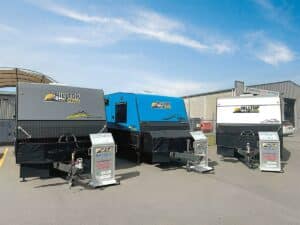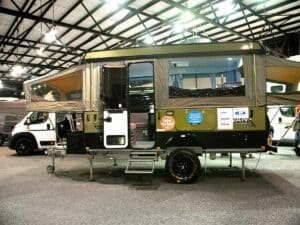As a writer who’s always worked from home, adjusting to work on the road was no great drama.
All I had to do was move my laptop into the camper van. While this transition may not be so straightforward for everyone, it’s still far easier than people think. The biggest thing that stops people from fulfilling their dream of living on the road is the fear of not being able to support themselves financially. However, as we have learned, there are endless opportunities. There are many people who live on the road and have no trouble finding ways to supplement their lifestyle, just like these ones.

Putting existing skills to good use
Steve and Fiona Watton began their journey two years ago at Trevelyan’s kiwifruit packhouse in Te Puke.
Upon leaving to travel south, they were told about a recruitment agency called Southern Solutions, which provides both seasonal and permanent work in the horticulture and viticulture industries. They applied and, through the agency, found work in Alexandra. When that job ended, the couple got stuck in to find more work opportunities. First, they used Google to search for all the vineyards and orchards in the area and then went door-knocking, dropping off CVs along the way. As luck would have it, they found themselves at a small family orchard in Alexandra and began work there the next day.
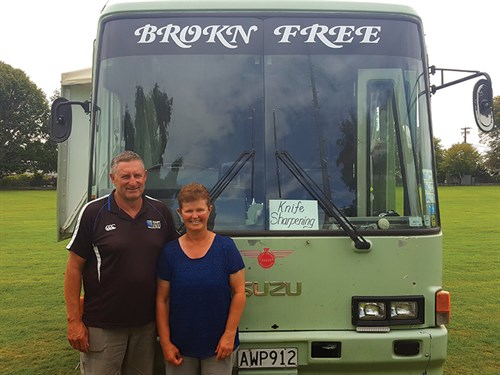
A former diesel mechanic, Steve put his handyman skills to good use immediately. Once the season started, they both worked in the packhouse. Fiona also did tractor work and Steve’s forklift license proved a useful asset. This summer they went back to the same orchard where they were given more responsibilities and more varied work. During their time on the road, Steve has undertaken other handyman jobs and he and Fiona have run a friend’s campground. “We work to travel,” Fiona says.
Our first meeting with Steve came about through a sign in the window of their eight-metre bus, advertising knife sharpening. It had attracted a queue of campers and with good reason. The knife we got sharpened by Steve is not only the best knife we have but it’s also sharper now than when we first bought it. His advice to anyone looking for work is simple but effective: “Go to the pub. Get talking to the locals and ask if there’s any work around.
Word of mouth is a wonderful thing and they’re the ones who know who’s got what and where.”
Having a can-do attitude
Corina Oldham has been living on the road for six years, travelling the country in her gorgeous hand-painted caravan with her dog Sam. Prior to living on the road, she was a maintenance electrician. These days she supports her lifestyle in several ways.
“My main job is helping out at the horse races,” Corina explains. “I work between three and six days a month at the gallops in Otago and Southland, as well as the North Island in the off-season down south, looking at the horses. I also work at a laundry, doing two- or three-week stints throughout the year and spend six weeks annually working as a technical assistant for Livestock Improvement Corporation’s artificial breeding programme.”
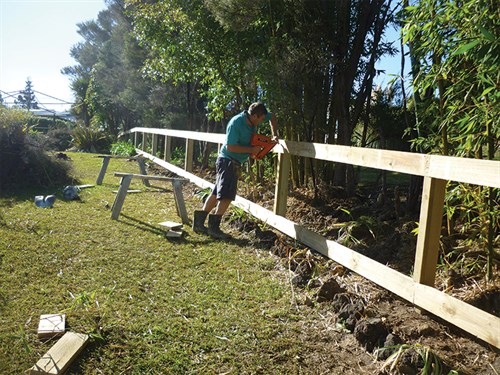
When it comes to finding work opportunities, or worrying about not being able to find them, Corina says, “I never thought about it too much before I hit the road. Work has always found me. However, it helps to put it out there and tell others what you want or need.” Like many people, she enjoys the freedom and variety working on the road brings. “For me, the best thing is being my own boss and no workplace politics. The only downside, if there is one, is that most seasonal work has a low pay for a lot of physical work.
“At the end of the day, finding work on the road is a mindset like everything. If you think it will be OK, it generally will be. You aren’t going to have a ball every day; things go haywire but that happens in life anyway. Do your research and talk to people but not so much that you get overwhelmed. Just make up your mind then get on with it.”
Turning a favourite hobby into an income
Margaret Jarden describes herself these days as a Professional Scenic Inspector. However, in her 44 years of travelling and living on the road, she has done all sorts.
“In my past lives, I’ve been a caregiver and had my own leather factory and shop. We’ve worked on farms, in factories, whatever we’ve needed to turn our hand to. My husband Larry has always been good with his hands, building everything from aluminium joinery to our motorhomes and even our house. We’re of the age now where we don’t need to look for work, but I still need to keep busy and do things to satisfy my creative side.”
When we first parked up next to their Nissan Civilian, in a picturesque spot on the Hibiscus Coast, there was a sign, advertising ‘Hobo Huggies’ in the window.
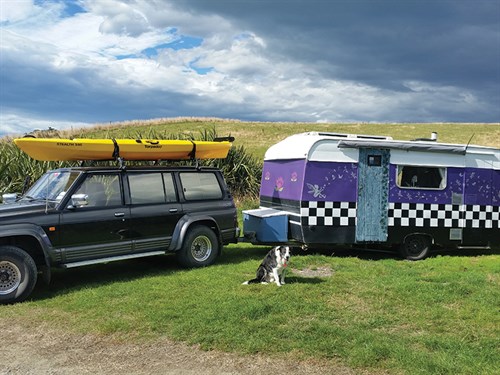
“Living in the bus, I had no room for my beloved sewing machine, so I turned to knitting,” Margaret says. The Hobo brand was created back in the days the Jardens had a Daimler bus of the same name. It was also the name of her leather business, so she decided to carry it on to her other projects.
While Margaret has had a ball at markets around the country, she is just as happy talking to customers from her bus. “I’ve literally been sitting on the side of the road and had people come along and buy things,” she says.
When it comes to finding opportunities, Margaret says the NZMCA is a great way to learn what’s out there. “It’s like family. We all help and support one another.”
To see Margaret’s array of lovingly made and unique bootees, artworks, and colourful Cutie Dolls, check out Hobo at facebook.com/thehoboteam.
Tips for working while travelling
When it comes to finding ways to support your new life on the road, don’t think of it as ‘what will we do?’, but ‘what can we do?’ Here are some ideas to get you started.
Become a house sitter
Housesitting is popular among motorhomers and a full-time occupation for many people. It’s also a fantastic way to keep living costs to a minimum. Reputable house sitters are always in demand. Check out Kiwi House Sitters on Facebook, or ask friends.
Check NZMCA job listings
The NZMCA is terrific at keeping its members informed of up-to-date work opportunities, from house/farm sitting to managing campgrounds, fruit picking, and more. If you are a member, keep an eye out for the monthly magazine or on the NZMCA website.
Work from your RV
Nothing is easier than working from your motorhome when you live on the road. There are plenty of ways you can work from your vehicle. If you are a wordsmith, you can register with websites such as upwork.com and pick and choose the jobs you like from a selection of thousands. It’s a great way to gain experience, sharpen your skills, and make a handy income at the same time.
Use your existing skills
Often people have previous skills they can bring on the road with them. For example, if you have an HT licence or dairy farming experience, you can pick up casual work such as calf rearing or relief milking easily.
Spend cautiously
It goes without saying, the less you spend, the less you have to earn. Fiona says, “When you hit the road, make sure you watch what you spend and how you live. We’ve met a lot of people who took two years or more to learn how to live within their means. If you can live cheaply, you’ll be fine.”

